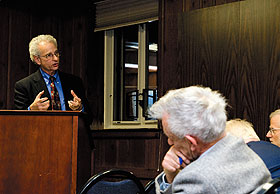  |
| HOME | THIS ISSUE | CALENDAR | GRANTS | BACK ISSUES | < BACK | NEXT > |
Seminar series promotes debate on foreign policy issuesby Scott Brinckerhoff - February 17, 2009
|
||||
| Since 1985, the Department of History has been hosting seminars on foreign policy that frequently ignite passions and challenge assumptions about events both major and minor throughout modern history. Whether the subject is the Cold War, World War II, Middle East disputes, or the U.S. occupation of Haiti early in the last century, the speakers have shown time and again that they are quite comfortable rocking conventional wisdom. “We choose people whose work we have read, or whom we have heard speak on another occasion, and most of the choices have been terrific,” says J. Garry Clifford, a professor of political science in the College of Liberal Arts and Sciences who has been associated with the program since it began. Some guests – such as Melvyn Leffler, the Edward Stettinius Professor of American History at the University of Virginia, who spoke in November on the Cold War – are luminaries in the field; other scholars come to UConn earlier in their careers. The seminars typically attract a crowd, including faculty from colleges in Pennsylvania, New York, and southern New England, as well as UConn President Michael Hogan, whose academic specialty is diplomatic history. “The seminars encourage intellectual diversity,” says Frank Costigliola, a professor of history in the College of Liberal Arts and Sciences who coordinates the series. “The idea is to provide students and faculty with a perspective from outside the University. For example, our speaker last month was from Australia.” Barbara Keys of the University of Melbourne spoke in January on the successes and failures of the international campaign to abolish torture, 1967-1984, in a talk titled “Making Torture as Unthinkable as Slavery.” “In the past,” adds Costigliola, “we’ve taken up such issues as the role of race in history, American involvement in the Philippines, and the war in Vietnam.” Stimulating debate Clifford recalls a talk several years ago by Kristin Hoganson, then an assistant professor at Harvard. She identified gender politics, rather than economics, as one of the prime motives for the United States’ decision to go to war with Spain and the Philippines at the threshold of the 20th century. “It was a fantastic talk,” says Clifford. “She used feminist theories to look at American foreign relations from a new perspective. She examined the language of the time, and showed a political cartoon questioning President McKinley’s ‘backbone’ and in effect, his virility.” The debate that follows the presentation may take a lively turn.
For example, in his presentation on the Cold War, Leffler argued that ideological inflexibility on both sides, memories of war, especially on the Soviet side, and a belief by each side that its political system was superior and would ultimately triumph, were key impediments to ending the Cold War. During the question and answer session, one participant challenged Leffler to comment on which side started the Cold War. A polite but heated debate ensued. Mike Neagle, a Ph.D. student in history who has been attending the foreign policy seminar series for the past five years, says the lectures provide a good atmosphere for considering provocative issues. “Professor Leffler’s lecture was the 92nd in the series, and like the others I’ve attended, his comments challenged some old assumptions and perceptions,” Neagle says. “He addressed a key dimension of the Cold War discussion by bringing out what was going on in each country domestically and how that affected foreign policy.” Parallels with the present When Leffler said one of the lessons of the Cold War is that “diplomacy matters, and negotiation helps produce an understanding of the adversary,” a student asked what he thought of then President-elect Obama’s position on negotiating with governments the Bush Administration had shunned. “I believe absolutely that the new administration should be willing to talk to adversaries,” Leffler responded. Costigliola credits Tom Paterson, emeritus professor of history, with launching the series and helping the University to achieve its reputation for excellence in teaching diplomatic history. In June 2012, UConn will host the annual meeting of the Society for Historians of American Foreign Relations, a professional organization of which Costigliola is currently president. Leffler, Hogan, and Paterson are all past presidents. That event will be a national version of the UConn Foreign Policy Seminar. |
| ADVANCE HOME UCONN HOME |

